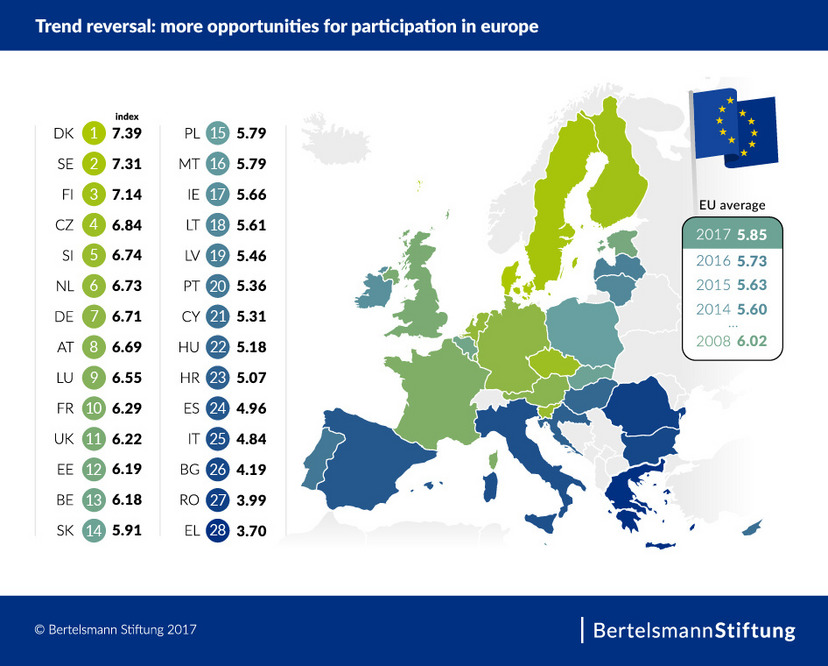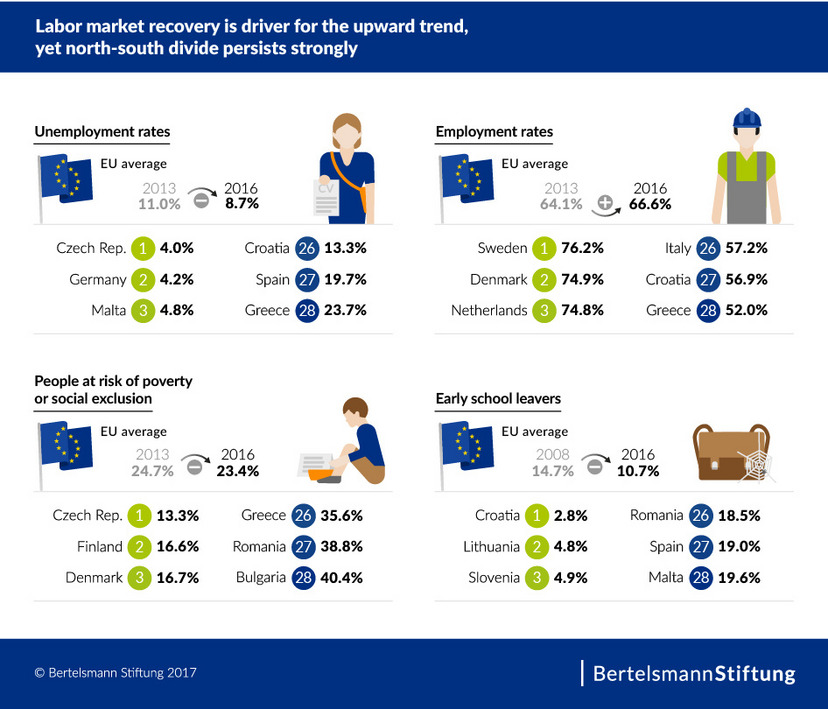
IStockphoto / George Clerk
Nosedive halted: recovery on the labour market improves social justice in the EU
Rising poverty, youth unemployment and impending sovereign bankruptcies – Europe has been undergoing a stress test almost permanently since the financial crisis began in 2008. For a number of years, the opportunities for people to participate in society worsened considerably in most EU states. But now a new trend is emerging.
A discernible upward trend is emerging in the EU as regards social justice. This improvement in opportunities for social participation is mainly being driven by a marked recovery on the labour markets. Labour market data has improved year on year in 26 of the 28 EU states. The EU's average unemployment rate fell to 8.7 per cent in 2016, having stood at 11 per cent in 2013 at the height of the social crisis.
However, the recovery is proceeding at two different speeds: the gap between northern and southern Europe remains substantial. Especially in the crisis-hit countries in the South, an above-average proportion of children and young people remain at risk of poverty and exclusion. These are the findings of the Social Justice Index 2017 – a tool which has been used annually since 2008 to analyse participation opportunities in the EU on the basis of 38 economic and social criteria. The Scandinavian countries Denmark, Sweden and Finland are once again at the top of the table this year. Despite some improvements, Greece continues to bring up the rear.

Bertelsmann Stiftung
Our Social Justice Index investigates the respective opportunities for social participation in the 28 EU member states.
Upward trend also in the crisis-hit countries - nevertheless the situation is still worrying
The recovery on the European labour markets is illustrated by the EU employment rate: two thirds of EU citizens who are able to work now have a job (2013: 64.1 per cent, 2016: 66.6 per cent). Although this upward trend can also be seen in the crisis-hit countries, the figures there are still worrying: unemployment has fallen from 27.7 (2013) to 23.7 per cent (2016) in Greece and from 26.2 to 19.7 per cent in Spain.
Youth unemployment is also down slightly in southern Europe. Nevertheless, almost half of young people who are able to work remain jobless in Greece, the lowest-ranking country in this category (2016: 47.3 per cent, 2013: 58.3 per cent). By comparison, youth unemployment stands at 7.1 per cent in Germany, the top performer in this regard.
"Political leadership is now called for throughout the EU. It has to ensure that everyone benefits from the upward trend. Young people in particular must not be abandoned."
Aart De Geus, chairman and CEO of the Bertelsmann Stiftung

Bertelsmann Stiftung
The recovery from the crisis is proceeding at two different speeds, so the gap between north and southern europe is still big.
Lower risk of poverty, greater educational equity, North-South divide remains
As a consequence of the positive employment trend, the risk of poverty and social exclusion has also fallen: while 24.7 per cent of the EU population was at risk of poverty at the height of the economic crisis in 2012/2013, the latest index suggests that the figure is now somewhat below a quarter (23.4 per cent). However, this still equates to approximately 117.5 million people. Furthermore, the struggling countries in southern Europe are still treading water in particular: 35.6 per cent of the population in Greece remains at risk of poverty or social exclusion along with 27.9 per cent in Spain and 28.7 per cent in Italy. By way of comparison, the figures for Denmark, Finland and the Czech Republic – the top three countries for preventing poverty – are between 16.7 and 13.3 per cent.
The risk is substantially higher for certain sections of society, such as children and young people: EU-wide, more than a quarter of children and youths under the age of 18 are at risk of poverty and social exclusion. This equates to around 25 million people. Despite a slight reduction, countries such as Greece and Spain are still reporting figures of 37.5 and 32.9 per cent respectively. However, there is reason to believe that the gap between northern and southern Europe will narrow in the future if the labour market recovery continues.
Education opportunities have also improved in the majority of member states compared with several years ago. For instance, the proportion of students leaving school with no qualifications has fallen throughout the EU (2008: 14.7 per cent, 2016: 10.7 per cent). The authors criticised disturbing developments in a number of eastern European states, however: "We are seeing the right-wing populist governments in Hungary and Poland in particular making far-reaching changes to the education system and thereby reversing past achievements," said Daniel Schraad-Tischler.
Please find the complete study and additional data on all 28 EU member states hereand at www.sgi-network.org




